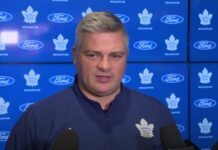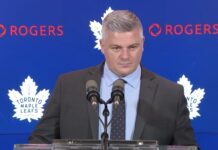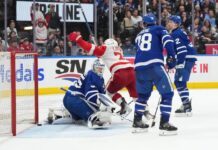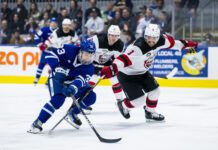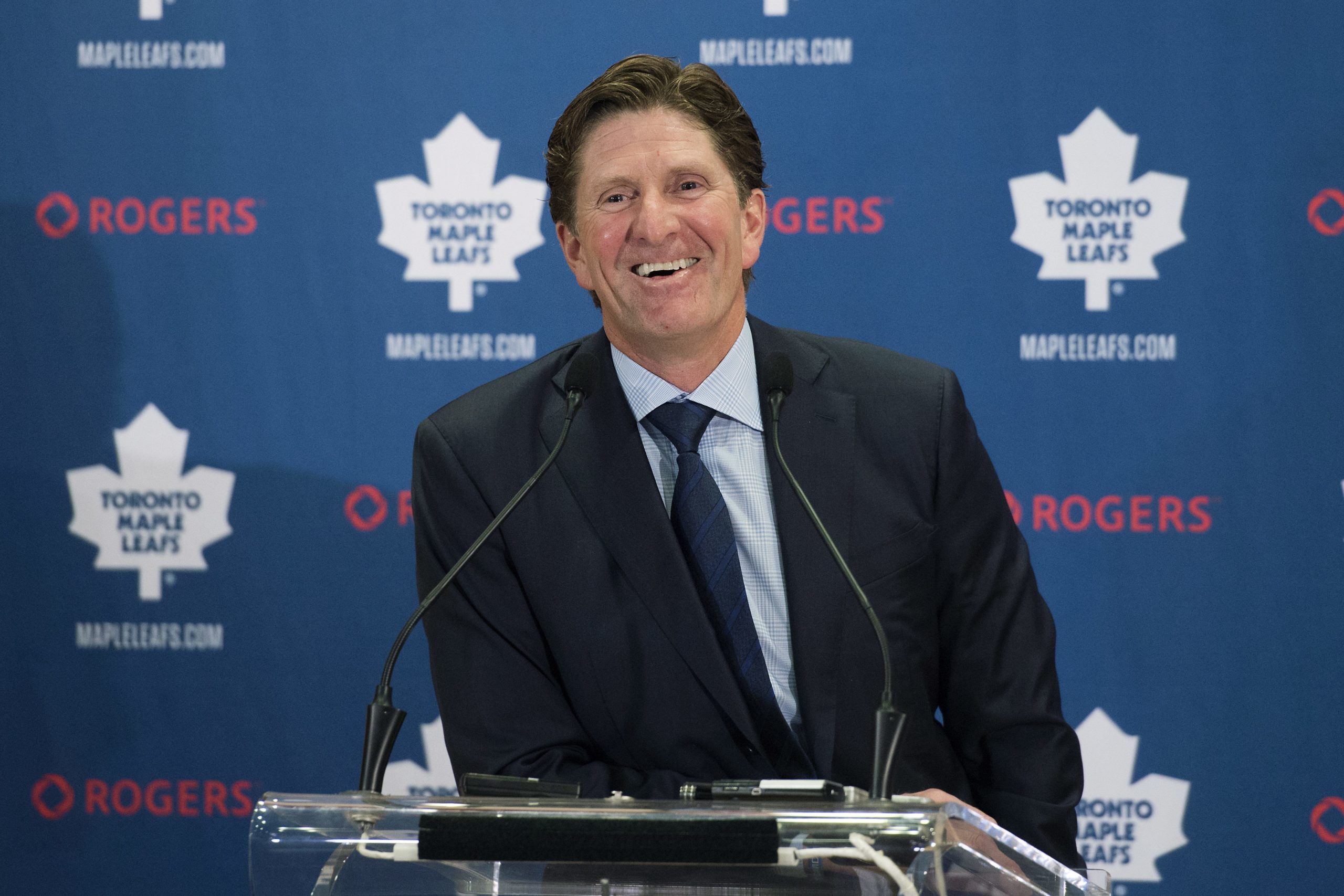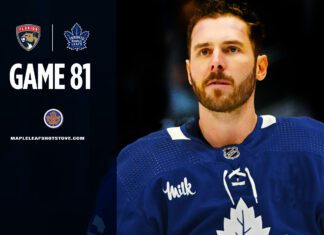Head coach Mike Babcock meets with the media on the opening day of 2017 training camp.
You’ve got all sorts of firepower on your team. How important will the addition of the three veterans in the offseason be to improving things in the defensive end?
Babcock: Well, I think it’s just improving us overall. They’re all good players. They all bring different things. I think we’re improved team talent wise from last year and experience wise from last year. We’ve done more and now we’d like to take a step. We think these guys – as much because of the men they are as the players they are – are going to help us with that.
Rielly and Bozak were talking about how there is excitement but the reality is you snuck into the playoffs on the second from last game and lost in the first round.
Babcock: I don’t feel we snuck in at all. The great thing about the NHL is there is 82 games. No one gets to sneak in. You’ve got to win your way in. The second thing I’d say, though, is when you’re in the playoffs with 20 games left, it’s a way different feeling than playing your way in at the end. The other thing about it is – I always used to say that if you’re playing on my birthday and you’re having a good year, that means you’re starting the third round. I haven’t seen a third round… I can’t even remember how long it’s been for me. I missed you guys so much that we’re going to play longer in the Spring so I can be around you more.
On Morgan Rielly elevating his play in the playoffs:
Babcock: I just think, for all of them, when I see our guys – and it’s just scrimmage before camp and I understand that toally – it’s pretty evident that lots of guys got to work after we lost out. To me, what training camp is all about is getting to show off how much work you did in the summer. The best of the best in any walk of life are trying to reinvent themselves, whether that be with a skills coach, a strength coach, a nutrition person. You’re trying to find a way to take another step, to add on layers for your career. That could be because you’re trying to make your career longer because you’re at the end; it could be because you’re trying to get a spot on the team. It could be because you’re trying to get to be an 18-minute forward. In order to take steps, you’ve got to put in the work. What I like about our group is a lot of guys have put in the work. Morgan Rielly would be no different.
Can you see your team grow? Do you have an opportunity to do that when you’re coaching during the regular season, to sort of sit back and go, “I see it coming.”
Babcock: For sure. Last year, I thought we grew tremendously during the year. And that’s what is real important here – not to get ahead of ourselves. You just take a step a day. I need guys to be all in every day. That’s what I expect: Be focus and be all in every day, and we’ll get better together gradually. We’re going to have some turns in the schedule where it’s not always going [well]. But when you look at it at the end, you’d like it to be a line, but there’s still some dips. In order to do that, you need good players. You need competition for spots. You need a group that trained all summer. And you need to be all in. We have that.
How has Naz continued to evolve into an all-around player? What’s the next step for him?
Babcock: The first step he did was get in shape. I think Naz has had the best summer since I’ve known him, for sure. That’s a huge part of things. You arrive with legs. You feel like you’re getting going and you get some traction. Now, injuries get in the way of everything I’ve talked about, but – in saying that – right now in our group we’re excited about our group because, like I said to you, the guys seem to have really dug in and done the work in the offseason. That doesn’t guarantee success but it sure gives you a chance.
With him, will there be more on his plate now, from your end?
Babcock: I thought a lot was on his plate last year. I just think that he’s got to keep getting better. In the end, though, in a series, you play head-to-head against the same guy all night long for six games. You might’ve had the play early in the series but the other guy had the play late in the series. You’ve got to have the play all series.
In improving in the NHL, there is an easy step which you might have taken last year where you get your talent and you can maybe sneak up on people. Now, would you say that you’ve entered the hard part of improving, and what do you do to make that easier?
Babcock: I don’t know. I arrived here and it didn’t look like it was very easy to me. The year before I came here, things didn’t look very easy. I just know that the year you’re in – whether that be marriage or life – is the hardest one. If you commit all in that year, you don’t have to worry about anything; you’re just all in. If I deal with today and live in the present, everything is good. I’m not spending much time worrying about next year. I’m going to worry about today and tomorrow and try to get better. I can’t tell you which is the harder step. I don’t know that for sure. I just know we’re a team going in the right direction and we want to take another step this year. We’re excited.
Do you have a number in mind for Frederik Andersen in terms of workload?
Babcock: I heard another coach get asked this the other day, so I’m going to say what he said. 60 – that sounds good. I don’t know. We’ll see how he’s doing. We’ll see how healthy he is. We’ll go on the back-to-backs. Can it be 60 and 22? Sounds like good math to me. I think the better we play, the easier it is on the goaltender. We’ll see how it all works out. We’ll see how health is, and how he’s playing and how we’re playing.
Along those lines, Frederik did take a step last year in terms of playing the bulk of the season – something he hadn’t done before. How much do you think he learned last year that will help him prepare this year to better be able to manage getting into that 60-65 game range?
Babcock: The first thing is he’s already been here. He’s used to you guys. He’s used to the situation. He’s used to the contract. He’s in better shape than he’s ever been in his life, which is huge for him. He’s done the work. That doesn’t guarantee success, but it gives you a chance. Because of his fitness, he should be able to play more. You add it all up and it’s looking pretty good for Freddie.
It seems you have more NHL forwards than you have spots on the roster.
Babcock: Isn’t that great, eh?
How will contract status and waivers change how you view that competition?
Babcock: We’re not going to do anything silly. The right people always end up on the team. Sometimes they don’t end up on the team right away.
How much involvement did you have in pursuing Patrick Marleau and why is his age kind of irrelevant that you would give him a three-year contract?
Babcock: Just because of the way he skates. Obviously, he had some interest in us. We had some interest in him. We think he’s a good player and a good man. Patty can play on any line. When I was talking to Patty, I basically just said, “I don’t have a clue who you are playing with. I don’t have a clue if you’re playing with Naz or playing with Bozie or if you’re playing with Matty, but they’re all good.” We’ll figure that out over time. Come here; I think we’re going in the right direction.
What I like about Patty probably the most is the kind of man and the kind pro he is. He does it right every day. Doesn’t say much. Comes to work, likes hockey. Ultra fit. Can fly. Can check. Can score. Good player.
I don’t think he’s going to score like he did when he was 32, or whatever. But he’s getting 20 and he can play all night long. I think he’s a good player for us and it’s important for young guys to have somebody to emulate, and he’s a good guy for that.
Will you have a captain this year?
Babcock: No.
What are the little things that help a guy avoid the drop off in the second year?
Babcock: I think what happens and leads to a drop off is when you get complacent. The season ends and you feel real good about yourself. You go on a holiday. You go golfing. And then you go on another holiday. And then you go golfing. And then you go on another holiday. And you forget there is a gym and how hard you worked and how hard you competed and you forget your skill coach and shooting coach and all of the things you did. But what I found over the years is the hungrier you are, the more you find and pursue knowledge and try to get better. I think our guys did a real good job of that this summer. We have lots of resources here just with our sports science guys and our skills coaches. They also, and I think it’s real important – some teams don’t like it as much – to go out and get outside help as well to improve your game. They’ve done the work for sure. It showed in their fitness tests thus far, and I think it’s going to show on the ice.
Whether or not Roman Polak sticks, is this a move the club thought it should make based on his service and what he did last year?
Babcock: I think Polie is an unbelievable man. Obviously, he played real well for us. It was a big blow for us when we lost him just because of the penalty kill alone and his physical presence. He’s done everything right for us since I’ve been here. He needs this opportunity and we’re happy to have him here.
You’ve added some really solid veterans. How much do you think that will help your club?
Babcock: That’s a good question. What percentage? I don’t know the answer to that. I just think it’s real beneficial to have them. We’ve improved our depth up front. You just said there are too many NHL forwards for the amount of spots, and I think that’s key. On good teams I’ve coached before, there’s always too many players for the amount of spots. You have good depth when you have ten top-nine forwards. I believe we have that. We’re much deeper on the backend, too, and we’re going to see that play out during camp. Our camp in Niagara is to build structure and work ethic into our lineup, but then the eight exhibition games are for players. It’s an individual time of year for them to fight for their chunk of cheese and what you’re going to get. Whether you’re going to be the first call-up to the American league, or the first call-up to the NHL, whether it be power play or penalty kill, a regular shift, 18 minutes, 16 minutes… you’re all fighting for different things, but there is something out there for you and that’s why you want to put your best foot forward.
It’s unusual for a high-end center to have more goals than assists. Is the next step for Auston to bring up that number and create more offense for others, or how do you view that?
Babcock: I haven’t spent a whole lot of time thinking about that. I thought their line was a real good line for us. I thought it was a good line at playoff time, too. The growth of all of those guys is immense, to say the least. Their confidence and their swagger now compared to a year ago is much different now. We’ll see how his game evolves. I didn’t know he was getting 40 last year, so we’ll see what happens this year. Let’s just keep them all healthy and working hard.
How excited should the fans be for this season?
Babcock: Well, the fans are smart. They see what we see. They probably would like things to happen right away. We’re all like that. Immediate gratification is what the world is all about. Usually, it’s not like that. You’ve just got to keep getting better and better. I’m pretty consistent with that. We’re going to do what we can today, and then we’re going to come in tomorrow, and we’re going to do what we can tomorrow. We’re going to keep building and building. We’ll see where it takes us. We like our situation. We like our fan base. We think we’ve got the best hockey city in the world, for sure. Being a Leaf is a special, special thing now again. We’re all lucky to be that. We’re excited about the year.
Do you temper expectations in the room, or do you let them get excited by what’s happening?
Babcock: When you look at the expectations and go through all the teams in the East and say, “They’re better and they’re better and they’re better,” every team today meeting with the press thinks they’re making the playoffs. They’re all not making the playoffs. Let’s just get better and focus on getting better, and the rest will look after itself. What I do know is you’ve got to get out of the gate. The first 20 is so important each and every year. Training camp is so important because of that; they have to get off to a good start. We understand that and so that’s what we’re going to try to do.



